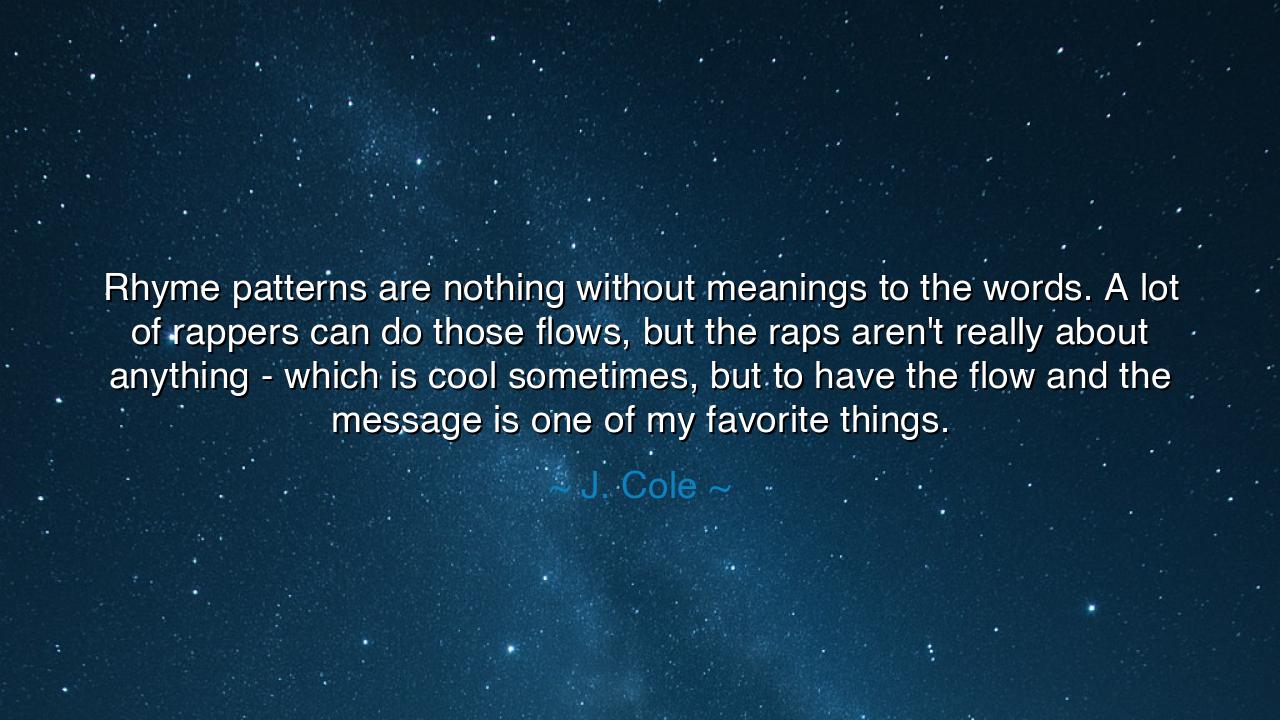
Rhyme patterns are nothing without meanings to the words. A lot
Rhyme patterns are nothing without meanings to the words. A lot of rappers can do those flows, but the raps aren't really about anything - which is cool sometimes, but to have the flow and the message is one of my favorite things.






When J. Cole declared, “Rhyme patterns are nothing without meanings to the words. A lot of rappers can do those flows, but the raps aren't really about anything - which is cool sometimes, but to have the flow and the message is one of my favorite things,” he was speaking not only to the craft of rapping, but to the very nature of art itself. In these words, Cole emphasizes that the form of an art is not enough on its own; it is the substance that gives it meaning, that gives it life. The flow, the rhythm, the rhyme patterns—these are the tools of expression, but without the deeper meaning, they are empty vessels. It is the message that imbues them with purpose, that makes them resonate with the soul of the listener. This principle transcends music and applies to all forms of art.
The ancients understood this concept deeply. The great poet Homer, in his epic works The Iliad and The Odyssey, wove intricate rhythms and rhyme patterns into his stories, but the true power of his work lay in the profound themes it explored: honor, fate, love, and the human struggle against the divine. Homer did not craft verses merely for the sake of sound; his words carried the weight of human experience, resonating with universal truths that continue to move us centuries later. The rhyme patterns were but the vessel—the true meaning was the message, the story that spoke to the hearts of all who heard it. This is the same spirit that J. Cole captures in his own art. His flows are not empty; they are filled with purpose, with themes of self-reflection, struggle, and social consciousness.
Just as Homer wove epic stories that transcended time, so too does J. Cole seek to transcend the superficiality of modern rap. The art of rap, much like poetry, can easily become a playground for the cleverness of words, for intricate flows and patterns that captivate the mind. But without meaning, those words remain hollow—an echo without substance. It is in the marriage of rhyme and message that true power is found. To have the rhythm, the flow, and the deeper message is to create something that speaks not just to the mind, but to the heart—something that transforms the listener, that moves them beyond the surface of entertainment into a deeper, more meaningful engagement with the world.
Consider the story of the philosopher Socrates, who, though he spoke in riddles and puzzles, always did so with the intent to uncover truths about life, virtue, and the nature of existence. His words were not mere cleverness for its own sake; they were a call to action, a plea for his audience to reflect on their own lives. Much like J. Cole’s raps, Socrates’ philosophy was designed to engage not just the intellect, but the spirit. The truth he sought was not hidden in fancy patterns, but in the meaning of his words, the impact they had on the listener’s soul. This is the hallmark of great art: that it is more than just beautiful—it is transformative.
J. Cole's words reflect an understanding of balance—the idea that it is not enough to be gifted with skill; one must also possess the wisdom to apply it meaningfully. Rhyme patterns are indeed impressive, but when those patterns do not serve the greater purpose of the message, they are like a beautiful shell without a pearl. To have both the flow and the message is to create something with depth, something that lasts. The great poets of old understood this balance well, and it is this very balance that J. Cole seeks to emulate in his own music. His raps are not just rhythms; they are stories, messages, and reflections on the world and his place within it.
The lesson for us is this: talent without purpose is fleeting. Whether in music, art, or any other endeavor, the beauty of skill must always be anchored in meaning. Strive not only for mastery of your craft, but for the wisdom to imbue it with purpose. Seek to reflect on the world around you, and let your work be a response to that reflection. The world is full of voices, but only those whose words carry truth and meaning are the ones that endure. The rhythms of life will continue, but it is the message behind them that will be remembered.
So, as you embark on your own creative journey, remember this: it is not enough to have skills; you must also have a vision. Let your talents flow, but let them flow toward something greater than themselves—let them serve a purpose, a message that speaks to the hearts and minds of those who encounter it. The greatest art, like the greatest words, is not just heard or seen, but felt—and it is that feeling, that deep connection, that makes it truly powerful.






AAdministratorAdministrator
Welcome, honored guests. Please leave a comment, we will respond soon